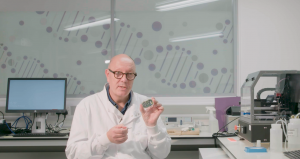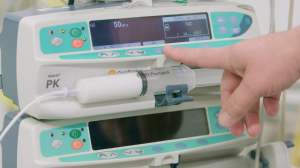A Bath medtech firm making anaesthesia safer for patients, better for the environment and more cost effective has raised £600,000 to develop its products further.
Somnus Scientific has a mission to improve patient survival and recovery rates following anaesthesia by unlocking alternatives to traditional gas-based anaesthetics.

Its new biosensor, which unlocks alternatives to standard gas-based anaesthetics, also reduces greenhouse gas emissions and enables patients to be discharged faster – optimising limited healthcare resources.
Somnus Scientific will use the funds to further develop its products before undertaking testing in the UK. A phased domestic and international launch, focusing first on Europe and then on global markets will follow.
Somnus Scientific co-founder and chief executive officer Dr Tim Craft, pictured, said: “The practice of keeping anaesthetised patients unconscious with gasses really hasn’t changed much in over 100 years, and 90% of operations worldwide are still performed using this technology.
“Anaesthetic gasses are heavily linked with nausea, slow recovery, memory loss and environmental damage, accounting for 5% of a typical hospital’s carbon footprint.”
Somnus’ solution is to aid the transition to the use of propofol, a short-acting sedative that supports a rapid, high-quality recovery with very low incidences of nausea and patient confusion.

Dr Tim Craft added: “Retrospective analysis indicates that patients who have cancer and are anaesthetised with propofol are more likely to be alive five years later than those given gaseous anaesthesia.”
Despite being first licensed for use in 1986, propofol has so far been primarily used as a drug for initiating anaesthesia, rather than a replacement for gases for its continuance.
This has been largely due to the inability to accurately measure the levels of propofol concentration in a patient’s blood stream in real-time, and therefore monitor the extent and depth of the patient’s sedation during a procedure.
Somnus’ world-first biosensor solves this problem. It uses enzymes to metabolise propofol, producing electrons that are measured at the sensor, enabling anaesthetists to monitor and adapt sedation levels in real time.
The company is also producing an adapted sensor to be used in intensive care units, where propofol is frequently used to sedate patients who, for example, are being mechanically ventilated.
To fund its research and development, Somnus began work with Innovate UK EDGE Access to Finance specialist Ed Tellwright.
The £600,000 was raised from a combination of private investors and a cornerstone institutional investor Utilico Emerging Markets Trust.
Dr Craft is now working with Innovate UK EDGE medical sector specialist Patrick Finnemore to identify potential partners and collaborators, and review the strategic direction of the company.
“The whole package of support from Innovate UK EDGE has opened doors that would have been very difficult to open by ourselves, and it’s really helping us to accelerate towards commercialisation,” said Dr Craft.
A Bath medtech firm making anaesthesia safer for patients, better for the environment and more cost effective for healthcare has raised £600,000 to develop its products further.
Somnus Scientific has a mission to improve patient survival and recovery rates following anaesthesia by unlocking alternatives to traditional gas-based anaesthetics.
Its new biosensor, which unlocks alternatives to standard gas-based anaesthetics, also reduces greenhouse gas emissions and enables patients to be discharged faster – optimising limited healthcare resources.
Somnus Scientific will use the funds to further develop its products before undertaking testing in the UK. A phased domestic and international launch, focusing first on Europe and then on global markets will follow.
Somnus Scientific co-founder and chief executive officer Dr Tim Craft said: “The practice of keeping anaesthetised patients unconscious with gasses really hasn’t changed much in over 100 years, and 90% of operations worldwide are still performed using this technology.
“Anaesthetic gasses are heavily linked with nausea, slow recovery, memory loss and environmental damage, accounting for 5% of a typical hospital’s carbon footprint.”
Somnus’ solution is to aid the transition to the use of propofol, a short-acting sedative that supports a rapid, high-quality recovery with very low incidences of nausea and patient confusion.
Dr Tim Craft added: “Retrospective analysis indicates that patients who have cancer and are anaesthetised with propofol are more likely to be alive five years later than those given gaseous anaesthesia.”
Despite being first licensed for use in 1986, propofol has so far been primarily used as a drug for initiating anaesthesia, rather than a replacement for gases for its continuance.
This has been largely due to the inability to accurately measure the levels of propofol concentration in a patient’s blood stream in real-time, and therefore monitor the extent and depth of the patient’s sedation during a procedure.
Somnus’ world-first biosensor solves this problem. It uses enzymes to metabolise propofol, producing electrons that are measured at the sensor, enabling anaesthetists to monitor and adapt sedation levels in real time.
The company is also producing an adapted sensor to be used in intensive care units, where propofol is frequently used to sedate patients who, for example, are being mechanically ventilated.
To fund its research and development, Somnus began work with Innovate UK EDGE Access to Finance specialist Ed Tellwright.
The £600,000 was raised from a combination of private investors and a cornerstone institutional investor Utilico Emerging Markets Trust.
Dr Craft is now working with Innovate UK EDGE medical sector specialist Patrick Finnemore to identify potential partners and collaborators, and review the strategic direction of the company.
“The whole package of support from Innovate UK EDGE has opened doors that would have been very difficult to open by ourselves, and it’s really helping us to accelerate towards commercialisation,” said Dr Craft.


















